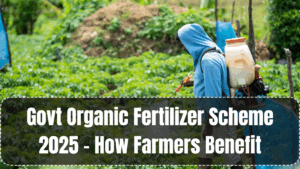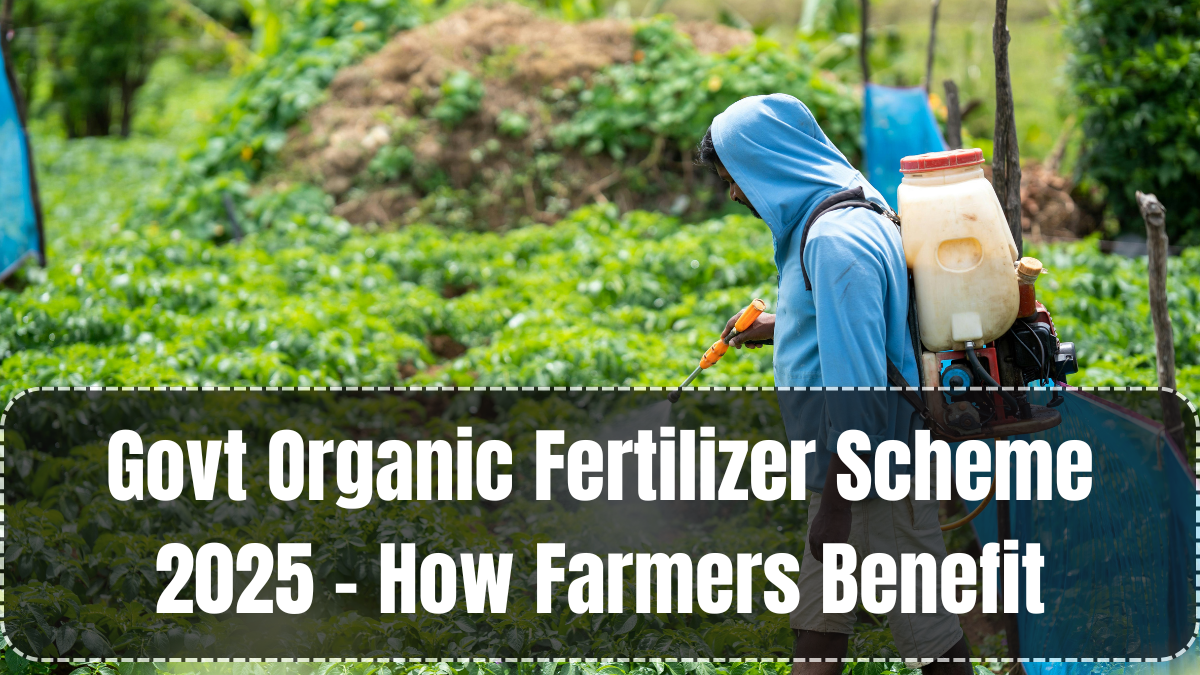To promote sustainable agriculture and reduce the harmful impact of chemical fertilizers, the Indian government has launched the Organic Fertilizer Scheme 2025. This scheme provides financial subsidies and training support to farmers who shift toward organic manure, compost, and bio-fertilizers in crop production.
The initiative aims to increase soil health, enhance crop yield naturally, and reduce the long-term environmental degradation caused by synthetic inputs. With organic demand growing both domestically and internationally, the scheme offers farmers a sustainable and profitable alternative.

Objectives of the Organic Fertilizer Scheme 2025
The Organic Fertilizer Scheme 2025 is part of the broader National Mission on Sustainable Agriculture (NMSA). It supports individual farmers, cooperatives, and self-help groups in transitioning to natural inputs.
Key objectives include:
-
Reduce dependence on urea and synthetic fertilizers
-
Promote production and use of certified organic manure
-
Support composting units and bio-fertilizer production centers
-
Improve soil microbial activity and fertility
-
Encourage organic certification and farm-to-market linkage
The scheme supports a long-term vision of healthier crops, better nutrition, and climate-resilient farming.
Subsidy and Financial Support Details
The government provides direct subsidy assistance to farmers and cooperatives for purchasing organic inputs or setting up composting units.
| Component | Subsidy Amount | Beneficiaries |
|---|---|---|
| Purchase of certified organic manure | ₹500 per ton (max ₹5,000) | Individual farmers |
| Vermicomposting unit setup | 50% of cost (up to ₹25,000) | SHGs, FPOs, individual farmers |
| Liquid bio-fertilizer support | ₹300 per hectare | Farmers under organic clusters |
| City compost transportation subsidy | ₹1,500 per ton | Urban compost suppliers to farms |
Subsidies are disbursed via Direct Benefit Transfer (DBT) after verification of purchase or setup completion.
Who Can Apply for the Scheme?
The Organic Fertilizer Scheme 2025 is open to:
-
All individual farmers with valid land records
-
Farmer Producer Organizations (FPOs)
-
Women-led Self-Help Groups (SHGs)
-
NGOs involved in organic farming outreach
-
State agriculture departments and Krishi Vigyan Kendras (KVKs)
Farmers enrolled in Paramparagat Krishi Vikas Yojana (PKVY) or NPOF (National Project on Organic Farming) are given preference.
How to Apply for the Organic Fertilizer Subsidy
Farmers and organizations can apply online or offline based on their state’s agriculture department process.
Steps to apply:
-
Register on the https://agrimachinery.nic.in/ or state agri portal
-
Upload Aadhaar, land records, and bank account details
-
Attach invoice or estimate for organic input purchase or compost unit setup
-
Await field-level verification and subsidy approval
-
Subsidy is released directly to the beneficiary’s bank account
Offline applications can also be submitted at block-level agriculture offices with help from extension workers.
Benefits of Switching to Organic Fertilizers
Adopting organic inputs is more than an eco-friendly choice—it’s a pathway to long-term farming resilience and higher profitability.
Benefits for farmers include:
-
Improved soil health and moisture retention
-
Lower input cost in the long run
-
Reduced pest resistance due to natural biodiversity
-
Higher price realization for certified organic produce
-
Eligibility for export and niche domestic markets
Organic farming also attracts support from private retailers, agri-tech startups, and FPOs who offer buy-back contracts and branding.
Government Outreach and Awareness Programs
The government has rolled out large-scale campaigns and demonstration plots to educate farmers about organic methods.
Support initiatives include:
-
Mobile vans showcasing composting units
-
Farmer training sessions in collaboration with ICAR
-
Radio and TV awareness programs in regional languages
-
100+ Organic Farming Resource Centers established nationwide
-
Annual Organic Mela events to promote local organic brands
Women farmers are also being trained as “Organic Ambassadors” under Mahila Kisan Sashaktikaran Yojana.
Final Thoughts
The Organic Fertilizer Scheme 2025 is more than just a subsidy—it’s a national movement toward sustainable, clean, and profitable agriculture. By embracing compost, bio-fertilizers, and traditional practices, farmers not only protect their soil but also tap into a growing market for chemical-free produce. With government backing and rising awareness, now is the perfect time to go organic.
FAQs
What is the maximum subsidy available for vermicomposting units?
Eligible applicants can receive up to 50% of the cost, with a cap of ₹25,000 for setting up a vermicomposting unit.
Can small and marginal farmers apply?
Yes, individual farmers including small and marginal landholders are eligible to apply with valid documents.
Are the subsidies available nationwide?
Yes. The scheme is implemented in all states through respective agriculture departments and is aligned with national organic missions.
Can I sell my compost to other farmers?
Yes. Farmers or SHGs producing surplus organic compost can sell to others and benefit from transportation subsidies and market linkage support.
Is certification necessary to avail of the scheme?
Certification is encouraged but not mandatory for basic input subsidies. However, for export-focused or premium sale channels, certification is beneficial.
Click here to know more.
